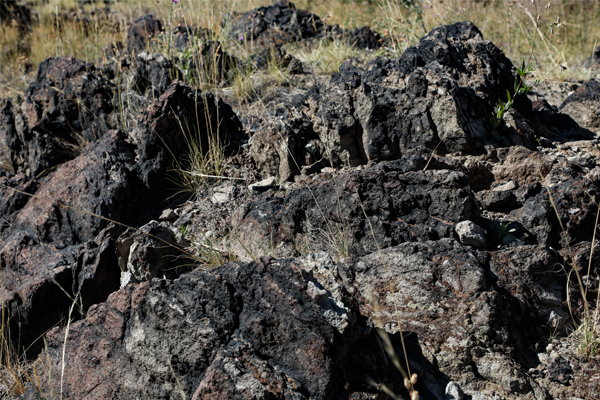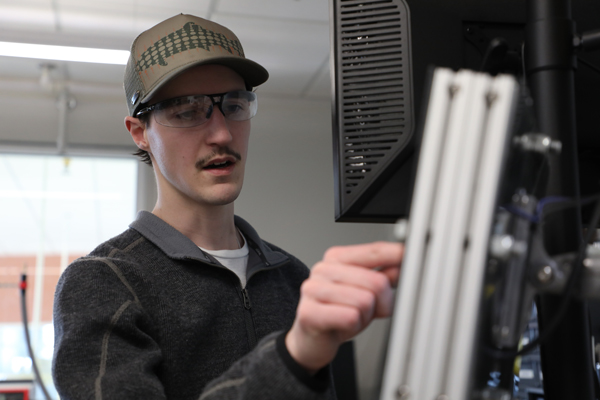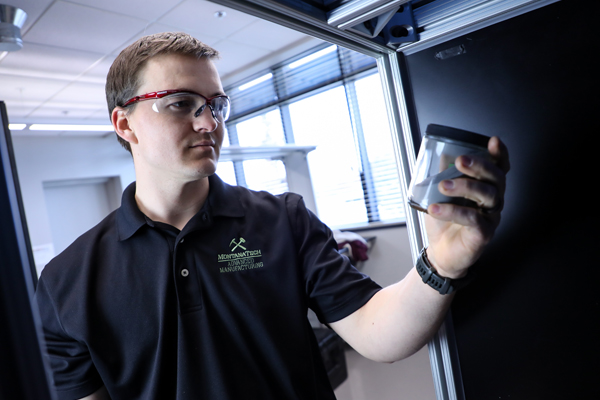
Geoscience, Geophysics Option, M.S.
Why Study Geophysics at Montana Tech?
This degree option gives you the opportunity to pick classes that suit your interests, and laser-focus your research on a specific geophysics topic.
Recent research projects in the department include: Oil Reservoir Characterization, Seismic Processing/Interpretation, Electrical Resistivity Studies, Digital Acoustic Sensing (DAS), Remote Sensing Analysis, Ground Penetrating Radar Studies, Shallow Seismic Investigations, Hydrogeophysics, Antarctic Geology, Gravity and Magnetic Studies, and Tectonics of Montana. Engineering geophysical applications are also of interest, and a recent project involved the combined use of seismic and electrical techniques in a groundwater development investigation.
Outstanding Faculty
Faculty members of the Geological Engineering department all hold Ph.D. degrees in subdisciplines including Civil Engineering with Geotechnical emphases, geochemistry, hydrogeology, and stratigraphy. Each faculty member has significant industrial experience they bring to the classroom, laboratory, and field site.
State-of-the-Art Equipment
Major department equipment includes a 144-channel seismograph; time domain EM system; ground-penetrating radar system; gravimeters; magnetometers; gamma-ray spectrometer; horizontal loop EM system; a resistivity, IP, controlled source AMT system; and three department vehicles for field work. Extensive use is made of the department's computing facilities including PCs, LINUX, and workstations, and a 28-node supercomputer.
World-Class Geophysics Lab
You have plenty of hands-on learning opportunities at Montana Tech. With access to state-of-the-art and fully equipped laboratories, you'll get the advanced knowledge and skills necessary to operate sophisticated instruments and equipment. In your geophysics lab courses, you'll have opportunities to assist your professions on innovative research projects too.
Geophysics Internships
Outside of the classroom, you’ll have even more hands-on experience through geophysics internships. Each year, through Career Services events, you’ll have access to more than 100 companies that come to campus to recruit Montana Tech students for geophysics summer internships.
Fantastic Location
By choosing Montana Tech for your geophysics degree, you’ll enjoy our location in Butte, Montana. You can and tour local operations and pursue internships in Butte as well as in nearby cities such as Bozeman, Helena, and Missoula. You’ll also have unparalleled opportunities to enjoy Montana’s great outdoors.
Be Ready for a Career in Geophysics
Montana Tech will go beyond just giving you the knowledge and skills you need for geophysics degree jobs. At Tech, we make sure you have the communication and interpersonal skills you need to be part of a team in a real-world environment. From engaged geophysics faculty to Montana Tech’s outstanding Career Services, you’ll have the resources, support, and connections to geophysics internships and jobs.
Study Geophysics and Have Fun Too
Get involved in various clubs and organizations on campus. Take a break from your geophysics studies to have fun skiing, fishing, hiking, and enjoying other outdoor adventures in Butte, Montana.
What is Geophysical Engineering?
>Geophysicists study the physical characteristics of earth and other planets by applying the principles of math, physics, geology, and engineering.
What Kinds of Jobs Do Geophysicists Get? >
The scope and importance of geophysics cannot be overstated. The oil and gas and mining industries employ geophysicists for their ability to locate deeply-hidden resources beneath Earth’s surface. Geophysicists are also employed in the engineering and environmental fields to locate groundwater, track pollution, locate utilities, and search for buried artifacts. Geophysics professionals are employed worldwide.
Montana Tech geophysics graduates follow a variety of important career paths. The oil, gas, and mining industries employ geophysicists for their ability to locate deeply-hidden resources beneath Earth’s surface. Geophysicists are also employed in the engineering and environmental fields to located groundwater, track pollution, locate utilities, and search for buried artifacts.
Explore Classes in Geophysical Engineering
Your courses at Montana Tech for geophysical engineering will give you a launch pad to a career that matters. You can work with your faculty advisor to create a slate of courses tailored to your interests. You can earn the Geoscience, M.S. option in geophysics by taking 30 credits and completing a thesis or publishable paper, or by taking 36 credits, without a thesis or paper.
Meet faculty, explore research expertise, and more.
Get semester-by-semester info about geophysics courses. The catalog is the go-to tool to understand degree requirements.
The NSF, Army Research Lab, and other top institutions regularly fund our faculty and scholars. Find a faculty member to supervise your project.

The Doctor of Philosophy in Earth Science and Engineering, builds on engineering and science BS and MS programs and the Montana Bureau of Mines and Geology. Become an expert in your field.

This distance learning program is designed to give working professionals an opportunity to enhance their technical and managerial skills with minimum disruption to their workday.

Choose from 12 specializations, including Civil, Electrical, Environmental, Geological, Geophysical, Geotechnical, Hydrogeological, Mechanical, Metallurgical/Minerals, Materials, Mining, and Petroleum.
We can answer your questions and help you get started.
Professor of Geophysics
xzhou@mtech.edu
406-496-4350